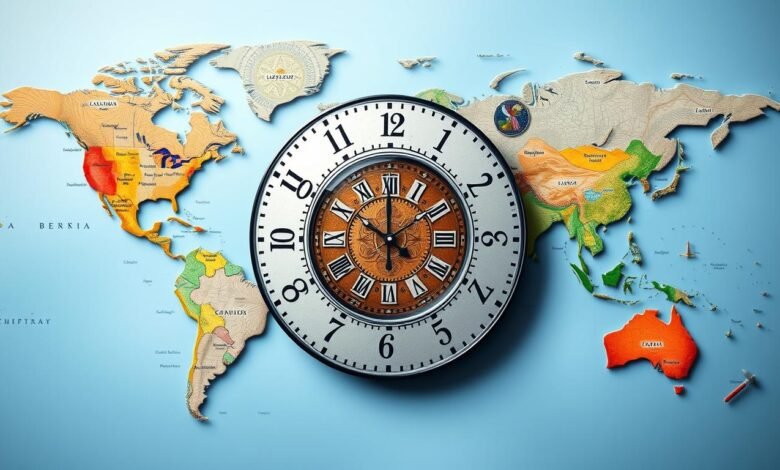The Importance of a World Clock in Today’s Globalized World

Global business thrives on connections across time zones. Keeping track of worldwide times can be challenging. A world time zone clock solves this problem efficiently.
These clocks display current times in multiple zones. They help organizations collaborate better and manage schedules effectively. Time-related errors and miscommunications are reduced significantly.
Wharton Electronics is a top maker of digital time zone clocks. They’ve served various industries for decades. World clock provides accurate, up-to-date information for different regions.
These tools empower organizations to improve their global operations. They help businesses stay connected with worldwide networks seamlessly.
Key Takeaways
- World time zone clocks enable effective global collaboration and time management.
- Wharton Electronics is a leading manufacturer of high-quality digital time zone clocks and systems.
- These clocks cater to various industries, including finance, military, and medical, providing accurate time information.
- Streamlining global operations and reducing time-related miscommunications are key benefits of using world time zone clocks.
- Staying connected with partners, clients, and colleagues across different time zones is crucial in today’s globalized business environment.
The Significance of Time Zones in a Global World
Time zones divide Earth into 24 regions with uniform standard time. They emerged in the 19th century. This system helps global commerce, communication, and travel.
Historical Development and Standardization
Before the 19th century, local time depended on the sun’s position. This created many time standards worldwide. As railways grew, a standard time system became necessary.
In 1884, the International Meridian Conference set Greenwich, England as the prime meridian. They divided the world into 24 time zones. Each zone is 15 degrees of longitude wide.
Coordinated Universal Time (UTC) later replaced this system. UTC uses atomic clocks instead of astronomical observations. Time zones now help global operations run smoothly.
- Earth is divided into 24 time zones, each 15 degrees of longitude wide.
- At one point, train stations in the United States had to manage 75 different time zones across the country.
- China, despite stretching across three standard time zones, operates on a single time zone.
- Every 15-degree section to the west from Greenwich is an hour earlier than Greenwich Mean Time (GMT), and an hour later for each section going east.
“Time zones play a crucial role in facilitating global businesses, international travel, and communication, with websites and online services using IP geolocation to detect users’ time zones and provide relevant information.”
The need for standardized timekeeping grew with transport and communication expansion. Time zones were the solution. They remain vital for international coordination and collaboration today.
Embracing the world clock: Streamlining Global Operations
Managing time zones is vital for global businesses and remote teams. A world clock enhances productivity and drives success. It’s crucial for international collaboration in today’s globalized business world.
Benefits for Businesses and Remote Teams
World time zone clocks help companies schedule meetings and deadlines across continents. This approach improves communication and prevents costly mistakes caused by time differences.
For global organizations, these clocks are essential tools. They enable smooth coordination of activities and efficient service delivery. This is crucial in finance, military, and healthcare industries.
- Streamline global operations and enhance productivity
- Facilitate seamless collaboration among remote teams
- Improve customer service and responsiveness
- Capitalize on opportunities in diverse time zones
- Foster a culture of inclusivity and respect for global diversity
World clocks help businesses grow and innovate. They provide a competitive edge in our fast-changing global marketplace.
“Adapting strategies to time zone complexities allows for the harnessing of global connectivity and unlocking new opportunities for collaboration, innovation, and growth in a globalized world.”
Conclusion
A world time zone clock is crucial in our interconnected world. It provides accurate information on global times, helping businesses and individuals collaborate effectively. These clocks improve time management and reduce errors caused by time differences.
World clocks are vital for navigating our globalized society. They help streamline operations and enhance productivity for businesses expanding across borders. Staying connected in the evolving global landscape is easier with this technology.
The world has 24 standard time zones based on Greenwich Mean Time. Major regions include Eastern Standard Time, Central European Time, and Pacific Standard Time. Understanding Daylight Saving Time changes is essential for managing international schedules.
FAQ
What is a world time zone clock?
A world time zone clock shows current times across global regions. It helps businesses work together better and manage time more effectively. This tool reduces mistakes caused by time differences.
How do time zones work?
Time zones are Earth regions sharing the same standard time. They range from UTC-12:00 to UTC+14:00, based on Coordinated Universal Time (UTC). Before the 19th century, local time depended on the sun’s position.
As railways grew, a standard time system became necessary. This led to the creation of our current time zone system.
What are the benefits of using a world time zone clock?
World time zone clocks help businesses run global operations smoothly. They make it easier to plan international calls and deliver services efficiently.
These clocks are crucial for finance, military, and medical industries. They help with timely transactions, market monitoring, and care delivery across different regions.
How do world time zone clocks improve collaboration and productivity?
World time zone clocks keep teams in sync for meetings and deadlines. This enhances communication and collaboration across different time zones.
Businesses can manage their time better with these clocks. They help avoid costly mistakes caused by time zone confusion.
Which companies are leading the way in manufacturing world time zone clocks?
Wharton Electronics is a top maker of digital time zone clocks and systems. They’ve been creating high-quality products for decades. Their clocks serve various sectors, including finance, military, and medical industries.

